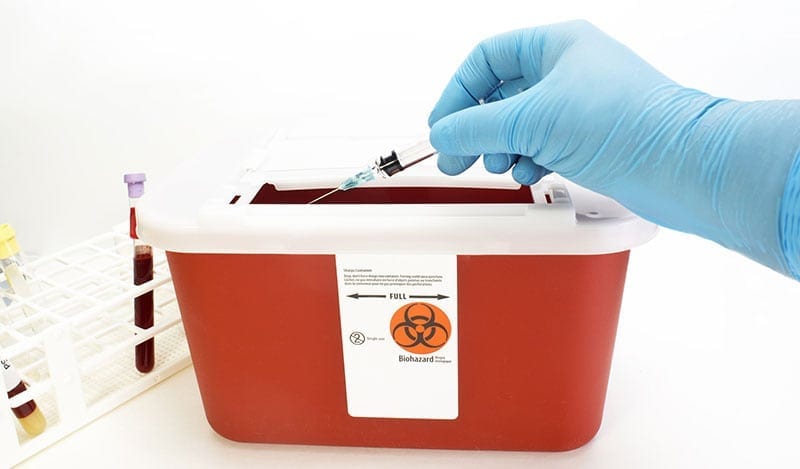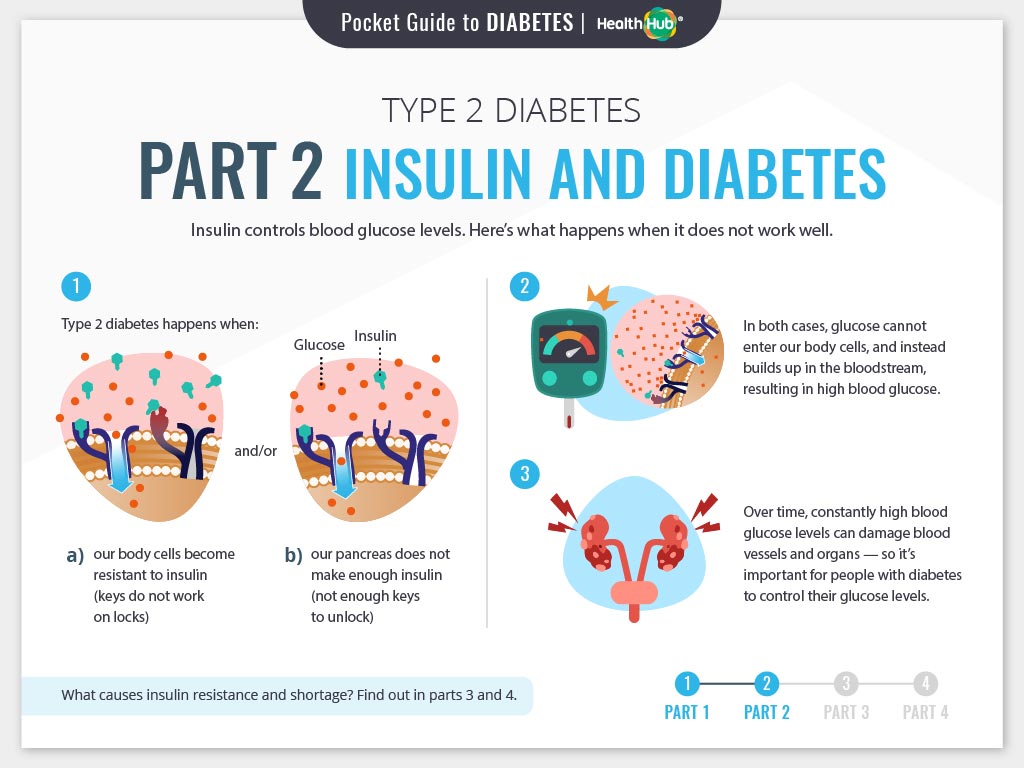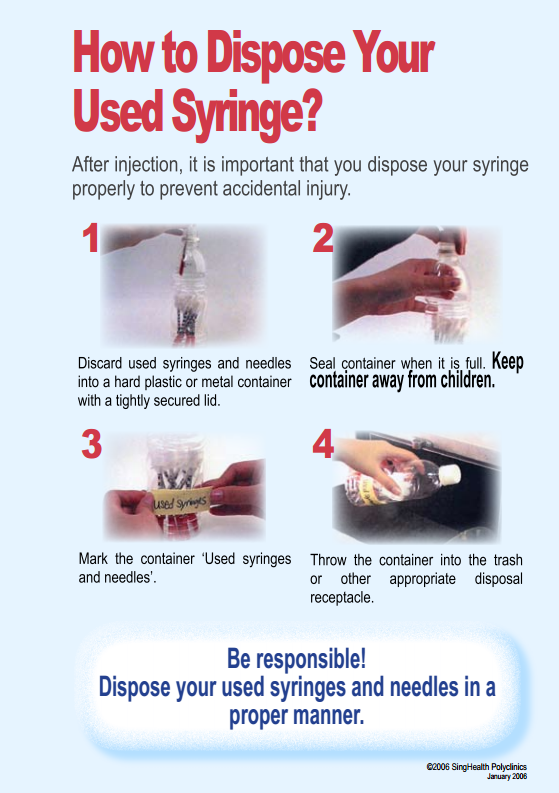How To Dispose Of Sharps When Travelling
Friday, 21 June 2019
One of the issues facing a person with diabetes when they travel is how to dispose of sharps.
Sharps are any medical item that can puncture or cut the skin. Sharps common in managing diabetes include syringes, pen needles and lancets .
Its important for the health and safety of all people who handle medical or general waste that used sharps are properly disposed of.
Appropriate disposal reduces the risk of contamination and disease transmission to those who handle this type of waste.
When disposing of sharps, its ideal to use a yellow sharps container that can be bought from any pharmacy, some council facilities or specialist supplies stores.
These travel cylinders come in a range of small sizes that are convenient to store in a small bag along with insulin and unused needles. This could be a pen needle pocket container that can fit in your pocket.
You may like to go to your local community health service as they often have a sharps container supply department that can give you a container at no cost .
To dispose of sharps at home, a strong container made from thick, heavy plastic with a tight-fitting or childproof lid is handy. An example is a used laundry detergent container.
The use of glass, tin, aluminium or soft drink containers is not recommended as a method of disposal of sharps as they are not shatter or puncture proof.
Be aware that some of these facilities will only accept sharps disposal if they are in yellow medical sharps containers.
Dispose Of Used Sharps Disposal Containers According To Your Community Guidelines
Sharps disposal guidelines and programs vary depending on where you live. Check with your local trash removal services or health department pages in your phone book) to see which of the following disposal methods are available in your area:
Drop Box or Supervised Collection Sites
You may be able to drop off your sharps disposal containers at appropriate chosen collection sites, such as doctors’ offices, hospitals, pharmacies, health departments, medical waste facilities, and police or fire stations. Services may be free or have a nominal fee.
Household Hazardous Waste Collection Sites
You may be able to drop off your sharps disposal containers at local public household hazardous waste collection sites. These are sites that also commonly accept hazardous materials such as household cleaners, paints and motor oil.
Mail-Back Programs
You may be able to mail certain FDA-cleared sharps disposal containers to a collection site for proper disposal, usually for a fee. Fees vary, depending on the size of the container. Follow the container manufacturer’s instructions because mail-back programs may have specific requirements on how to label sharps disposal containers.
Residential Special Waste Pick-Up Services
For more information specific to your state, call Safe Needle Disposal at 1-800-643-1643 or e-mail . Information they can provide for your state includes:
One Time Use Results In Many Needles Per Day
Because diabetic supplies can be costly, it is often tempting to reuse your diabetic needles and syringes. But most manufacturers and medical professionals will caution against it. After one use the needle can become dull. This can result in a painful injection the next time its used. In addition, it can result in an infection which could endanger your health. What this means is that you will likely end up using several needles per day. Because of this, its critical to dispose of them properly to reduce risk of injury to yourself and others.
Also Check: Can Metformin Lower Blood Pressure
What Is A Needle Clipper
Needle clippers are FDA-cleared sharps containers that automatically store cut needles, making an insulin syringe or pen needle unusable. This device can safely hold up to 1,500 clipped needles. Once a clipper safely removes the needle from a syringe, the syringe can be placed in the regular household trash.
Pointers To Help You Adjust

If you have been diagnosed with diabetes, it may take some getting used to.
While any new process can seem intimidating or overwhelming, you may find it helpful to write down each step of the process, including each step for proper disposal, as you get adjusted to your new routines.
We also suggest taking advantage of using online resources to further educate yourself about diabetes management. You may also want to connect with either an online community or in-person community of others living with the same condition, who can relate to you and provide guidance and advice. This type of support and community paired with taking the time to read informative blogs and guides can be an invaluable resource toward living with the highest quality of life possible, and can make a positive difference in how you handle your diabetes.
Proper disposal of medical waste is not just about following the rules or inconveniencing anyone–its about protecting the community and the ones we love. With a little planning and dedication, anyone can easily integrate these essential steps for diabetes management and proper disposal into their everyday routine.
https://www.webmd.com/diabetes/can-you-reverse-type-2-diabetes#:~:text=Although%20there’s%20no%20cure%20for,diabetes%20is%20an%20ongoing%20disease.
https://diatribe.org/diabetes-blogs-and-forums
Read Also: Basic Treatments For Type 1 And Type 2 Diabetes
Public Health Risks From Sharps
Medical sharps are often found in household garbage, recyclables or are flushed down the toilet. When these needles end up in the waste stream, they can injure waste haulers, landfill operators and recycling facility workers. When they are flushed down toilets, they may cause problems in plumbing and wastewater treatment plants or may end up on beaches, causing a potential health risk to humans and animals.
All needle stick injuries demand expensive testing, may cause long-term emotional stress and increase the risk of exposure to such infectious diseases as Hepatitis B and HIV from contaminated needles. Costs for a typical needle stick can run upwards of thousands of dollars.
To reduce public health risks, Wisconsin rules require all citizens to manage sharps safely. It is illegal to put sharps in the trash or with recyclables. Sharps must be packaged safely and treated either at a licensed medical waste incinerator or by methods that render the sharps non-infectious, broken and unable to be reused. It is not legal to merely solidify sharps.
The Importance Of Disposing Of Diabetic Sharps Properly
Syringe needles, pen needles and lancets pose many hazards if not disposed of properly. For instance, imagine a member of your local waste disposal team grabbing a plastic garbage bag you placed outside on trash day only to find that a used lancet has punctured the bag and now penetrated his or her skin.
Has the lancet been contaminated by other things in your garbage? Does your blood pose a threat due to a virus or other medical condition that you’ve now exposed this unsuspecting individual to contracting? We’ve used lancets as an example here, but it could just as easily be a pen needle or insulin syringe.
Diabetic sharps pose a risk to anyone who accidentally meets them, including family members or good friends you might be living with in the same house or apartment.
Never leave opened sharps lying around. Not on the bathroom vanity, not on a dresser or countertop, and dont toss your used sharps in the regular trash. This is a recipe for disaster that could very well cause someone you care about to get seriously hurt or become ill.
You May Like: Can You Be Born With Type 2 Diabetes
How To Safely And Properly Dispose Of Used Lancets Syringes Needles And Other Diabetic Supplies
There are currently more than 34 million people in the United States living with diabetes. That’s a large percentage of the population and this number continues to be on the rise with roughly another 1.5 million people being diagnosed with the disease each year. While different people manage and treat their diabetes in different ways, virtually all diabetics are required to test their blood sugar daily. Most diabetics still do this using a standard glucose meter.
Testing blood sugar using a glucose meter is a relatively painless process that includes pricking the tip of a finger with a sharp device called a lancet, placing a drop of blood on a diabetic test strip, and inserting the test strip into a compatible glucose meter. The glucose meter then measures blood sugar by converting the small blood sample into an electrical current.
Additionally, many people with diabetes require medication, most notably, insulin which is usually injected into the tissue just beneath the skin using an insulin syringe or a pen and pen needle. Another mode of insulin delivery is an insulin pump along with a compatible infusion set.
Household Hazardous Waste Collection Sites
These sites are run by local government agencies to collect hazardous waste such as sharps, paints, motor oil, petroleum, etc.
You can look them up online or through the yellow pages and contact them to drop off your sharps disposal containers at their location. They may also provide home pick-up services.
You May Like: Does Glucagon Stimulate Insulin
How To Dispose Of Needles Lancets And Blood Strips Properly
Some people with diabetes use supplies such as needles, lancets and blood strips which become medical waste. Learn the importance of disposing of them safely and properly. Find out the right type of containers to use for getting rid of sharps. Discover ways to dispose of medical waste in accordance with the law.
How To Dispose Of Expired Or Unused Insulin Vials
Follow these steps for quick and easy yet safe disposal of expired insulin at home. PS. You can follow the steps given below for any other prescription medication or off-the-counter drugs, liquids drops, or even medicated creams.
Additionally, there are some more options you can consider as well. Keeping in mind the ever-growing insulin shortage and availability crisis going on in the country, your unused insulin can be put to good use.
Several doctors stand by the fact that even expired insulin can be used by people with diabetes. It may not be as effective, but its better than not having the hormone at all.
You May Like: Glimepiride Metformin Dosage
Never Throw Used Sharps
Sharps that retract after use, or are very small, should be disposed of like all other sharps.
Most counties in California have disposal programs. Call the program to confirm if there are any container requirements, disposal fees or residency restrictions. for information on pharmaceutical company takeback programs.
Household Sharps Collection Sites

In Minnesota, it is up to each pharmacy, healthcare facility, city, and county to decide whether they want to collect household sharps from citizens. Many counties offer free or low-cost household sharps collection sites. Contact your county solid waste office or household hazardous waste program to find out if they collect household sharps for proper disposal.
Most healthcare facilities do not accept household sharps from patients, however, a few pharmacies in Minnesota do. Find Minnesota household sharps collection sites:
- Do not bring household sharps to a Take It to the Box household medication dropbox at a pharmacy or law enforcement stations.
- Dispose of prefilled syringes, such as EpiPen or Narcan injectors, with your household sharps.
- If your sharps container does not have a tight screw-on lid, use strong tape, such as duct tape, to secure the lid and any openings.
Don’t Miss: High Blood Sugar Symptom
State Guidelines For California
Beginning on September 1, 2008, State law makes it illegal to dispose of home-generated sharps waste in the trash or recycling containers, and requires that all sharps waste be transported to a collection center in a sharps containers or other containers approved by the enforcement agency.
Section 117671 of the California Health and Safety Code defines home-generated sharps waste as hypodermic needles, pen needles, intravenous needles, lancets, and other devices that are used to penetrate the skin for the delivery of medications derived from a household, including a multifamily residence or household.
The Department of Resources Recycling and Recovery is working to help develop a safe, convenient, and cost-effective infrastructure for collecting and properly disposing of home-generated sharps waste. Decreasing the number of sharps disposed in landfills will help prevent potential health risks to landfill and material recovery facility workers.
Helping Diabetic Patients With Safe Needle Disposal
Nearly 35 million people in the United States live with diabetes, which translates to more than one in ten Americans. This number has steadily risen over the past 50 years primarily due to dietary habits and the steady rise in obesity rates, which is a major risk factor for developing the most common form of diabetes, type 2.
Each November, the American Diabetes Association promotes American Diabetes Month to highlight the realities of living with the disease and to spread awareness of the challenges people with diabetes face. Proper disposal of sharps used in treatment is an important aspect of disease management that diabetics must deal with regularly. Lets take a closer look at this issue and discuss how healthcare organizations, pharmaceutical companies, and commercial businesses can provide support.
Recommended Reading: Metformin Side Effects Blurred Vision
Using Your Sharps Bin
You can use your sharps bin to dispose of medical supplies such as:
- needles
- lancets used with finger-pricking devices
- clippers
Put needles or similar medical supplies into the sharps bin immediately after using them and do not try to take them out again. Only fill the bin to where it says “Do not fill above this line”.
Keep your sharps bin in a safe place so it’s not a risk to other people and is out of the sight and reach of children.
Getting Rid Of Used Needles Syringes And Lancets
According to the Environmental Protection Agency, syringes and lancets are medical wastes called sharps. Sharps can be dangerous to those handling garbage, if the sharps are thrown in the regular trash.Sharps boxes are recommended for home use. Many pharmacies sell sharps boxes at a reasonable cost and will allow you to return the boxes when they are full.
You May Like: Can Diabetics Eat Instant Oatmeal
Other Medical Waste Disposal
Put soiled bandages, disposable sheets, medical gloves, and other contaminated non-sharp materials into a black or brown plastic bag. Securely tie or tape up the top of the bag. Place the bag in the center of your garbage when you throw it out. These guideline are available in an English brochure.
Connect with DOH
Disposing Of The Insulin Pen
People often prefer using insulin pens as they come with an autoinjector which makes the process easier. However, these pens do have the potential to cause injury if they arent handled properly.
Once youve used your insulin pen and need to discard or replace it, be sure to keep it in your sharps container.
You will also need to ensure that the sharps container is sealed and cannot be accessed easily.
Recommended Reading: Is Low Fat Cottage Cheese Good For Diabetics
Where Do I Dispose Of Used Sharps And Vials
In many cases, you may be able to bring used needles and other items back to your veterinarians office. They have the FDA approved sharps containers to store them until they are picked up by a licensed medical waste disposal company. You can also make your own sharps container using a hard plastic jug. One that has a lid that locks and that is puncture and leak proof. An empty detergent container is often a good choice. If you choose to take this step, its crucial that you never overfill it or leave the lid off. Once filled, you must take it to a medical waste disposal facility or to your veterinarians office to be disposed of. Although this may seem like an easy choice, if you have small children you may want to opt for bringing them back to your vet.
We all love our pets as they are part of the family. If you are administering medications to your dogs or cats using sharps, be sure youre disposing of them properly. This prevents accidental exposure, injury or illness to others and the environment.
Talk to us at All Points Medical Waste to learn more about safe disposal of sharps, medications, medical devices and more. We provide medical waste disposal services to physician offices, veterinarians, clinics, hospitals, treatment and surgery centers, dental offices and tattoo parlors, among others.
Managing Household Medical Sharps

It is illegal to put needles and other sharp medical items in the trash, recycling or medication collection drop boxes.
Medical sharps, such as needles, syringes and lancets, pose an injury risk for anyone who comes in contact with these items. Large numbers of sharps are used at home, work and on the road. If sharps are put in the trash or recycling or flushed down the toilet, they can injure sanitation workers or cause equipment problems. Therefore, it is important to properly package and dispose of all sharps. Learn how to properly dispose of used medical sharps below.
Dont Miss: What Happens If A Non Diabetic Takes Insulin
Don’t Miss: An Intestinal Hormone That Stimulates The Release Of Insulin From The Pancreatic Islet Cells Is

